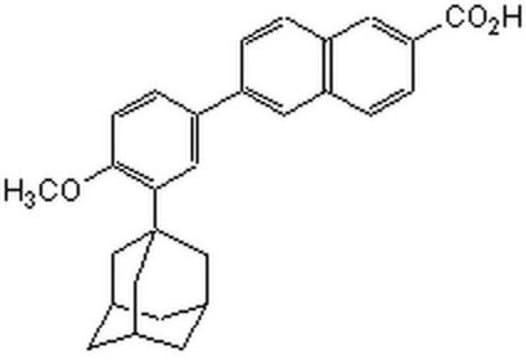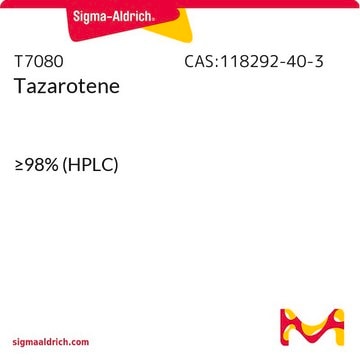A7486
Adapalene
≥98% (HPLC)
Synonym(s):
6-(4-Methoxy-3-tricyclo[3.3.1.13,7]dec-1-ylphenyl)-2-naphthalenecarboxylic acid, 6-[3-(1-Adamantyl)-4-methoxyphenyl]-2-naphthoic acid, CD-271, Differin
About This Item
Recommended Products
Assay
≥98% (HPLC)
form
powder
storage condition
desiccated
color
white to off-white
solubility
DMSO: >10 mg/mL
storage temp.
2-8°C
SMILES string
COc1ccc(cc1C23C[C@H]4C[C@H](C[C@H](C4)C2)C3)-c5ccc6cc(ccc6c5)C(O)=O
InChI
1S/C28H28O3/c1-31-26-7-6-23(21-2-3-22-12-24(27(29)30)5-4-20(22)11-21)13-25(26)28-14-17-8-18(15-28)10-19(9-17)16-28/h2-7,11-13,17-19H,8-10,14-16H2,1H3,(H,29,30)/t17-,18+,19-,28-
InChI key
LZCDAPDGXCYOEH-AADAIPAGSA-N
Looking for similar products? Visit Product Comparison Guide
Application
Biochem/physiol Actions
Features and Benefits
Signal Word
Warning
Hazard Statements
Precautionary Statements
Hazard Classifications
Repr. 2
Storage Class Code
11 - Combustible Solids
WGK
WGK 3
Flash Point(F)
Not applicable
Flash Point(C)
Not applicable
Certificates of Analysis (COA)
Search for Certificates of Analysis (COA) by entering the products Lot/Batch Number. Lot and Batch Numbers can be found on a product’s label following the words ‘Lot’ or ‘Batch’.
Already Own This Product?
Find documentation for the products that you have recently purchased in the Document Library.
Customers Also Viewed
Articles
We offer many products related to non-steroid nuclear receptors for your research needs.
We offer many products related to non-steroid nuclear receptors for your research needs.
We offer many products related to non-steroid nuclear receptors for your research needs.
We offer many products related to non-steroid nuclear receptors for your research needs.
Our team of scientists has experience in all areas of research including Life Science, Material Science, Chemical Synthesis, Chromatography, Analytical and many others.
Contact Technical Service









